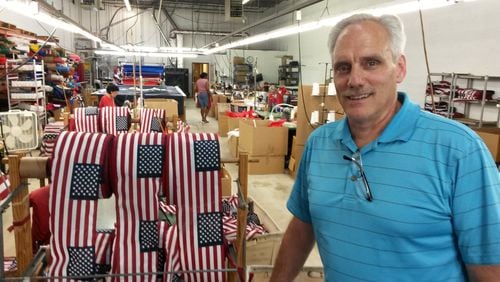Kempner’s Unofficial Business
This is a new column by me, Matt Kempner. I’ve been a reporter or editor since gas was about a dollar a gallon and “Hands Across America” was a thing. I’ve spent lots of time covering government, the environment and, for most of my career, business. But I don’t daydream about fiscal policy and corporate earnings. What I love about business is the strategy and the people and the journeys that those people take. I like irony and surprise and nuance. I’ve interviewed soldiers, oystermen, football stars, chicken plant workers, Fortune 500 CEOs, suburban activists and entrepreneurs dreaming big dreams. How cool is that? I’ve teared up in interviews, laughed inappropriately, been yelled at and snookered. I do like an adventure. Let’s see where this one goes.
So it has come to that flag again. That fabric, that symbol that has gotten in our faces yet again. Can’t clean it up enough to make it presentable for all. Can’t seem to get rid of it, as yet another Georgia governor gets caught in the tangle.
So controversy over the flag keeps its headlock on the South.
Not, though, with Steve Cook.
About a year ago he bought Atlas Flags, a small 30-person flag and banner maker in Tucker. It produces U.S. flags and Atlanta Braves flags and Georgia flags and custom jobs for businesses and a host of others. It also made what some refer to as the Confederate battle flag, the one with that bold X of stars.
Cook said he didn’t like the idea of making that flag when he bought the company. So he tells me he quietly stopped, gradually selling off those already in stock.
“It’s hard for me to get behind it and feel good about it,” he told me. “For me, it didn’t stand for the right things.”
That was long before the recent shootings at the Charleston, S.C., church. Before Walmart, Sears, Amazon and eBay opted to get out of the Confederate flag business.
Cook apparently isn’t a showy kind of guy. His business card doesn’t mention that he’s the owner of the company. When he decided to stop making the flags, he didn’t announce it publicly or even in some official way to his employees. He just stopped having the flags made.
This is what he told me when I called him out of the blue the other day in the wake of all the latest turmoil.
Cook, 53, who was born in Mississippi and spent much of his life in Maryland – which actually is south of the Mason-Dixon Line — didn’t grow up with some particular feeling, good or bad, about the starry cross. It was just a flag, he told me. And the only flag he feels a deep connection to, he said, is the one for our nation.
But when he bought the 76-year-old Atlas, Cook said he saw that stock of Confederate flags and also the range of employees now working for him – people from India and Latin American nations, a refugee from Bosnia and, yes, African-Americans.
Goodbye, Confederate flag. Other people can make you, Cook reasoned. He just didn’t want to be part of the supply chain, just like how he once turned down a buyer interested in ordering flags emblazoned with swastikas.
Cook estimates the Confederate battle flags represented only 3 percent or so of Atlas’ sales.
What would he have done, I asked, if it had been a bigger financial chunk?
“I like to still think I would have made the decision,” he told me. Which sounds to me more like hope than certainty.
He isn’t trying to guess what proportion of Rebel flag fans are honoring history, highlighting healthy regional pride, or displaying their renegade nature, as opposed to those who are just being racist dipsticks using the flag as a middle finger.
Cook also isn’t deluding himself about somehow extinguishing hate by not producing a flag with a certain color scheme.
Like other suppliers he has seen a rush of people interested in buying Confederate flags since big retailers and manufacturers announced they would drop the business.
He theorizes that some people are buying them with hopes of reselling at a hefty mark-up. Capitalism at work.
Virtually every major U.S. flag maker probably produced the battle flags in the last year, said Reggie Vanden Bosch , who is president of the Flag Manufacturers Association of America and a senior executive of Valley Forge Flag, one of the industry’s biggest players.
But he also said he suspects most of the battle flags are made in China and other nations because prices he sees for them are lower than what most U.S. makers could match.
Valley Forge, which is based in Pennsylvania but has a plant near Charleston, announced in recent days that it would no longer make the battle flag.
“We should have stopped it all together previously,´ Vanden Bosch told me, “but it took this issue to bring laser focus to our minds.”
Others will step into the gap, he predicted. “Somebody will make a business out of it in 12 and a half seconds.”
That’s OK.
For much of the 27 years she has worked at Atlas Flags, Tracey Miller has helped work with customers to fill their flag needs. Sometimes that included orders for Confederate flags.
Miller, who is African-American, said simply of the flag, “I don’t care for it.”
In her work role, though, she said, “you have to meet the needs of what the customer wants.”
But, in a free nation, business owners have some freedom to choose their own path. “It’s an accomplishment,” Miller said, “to have stopped production of that flag.”
About the Author







